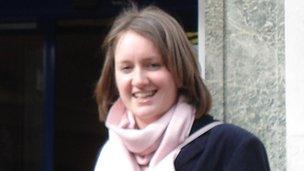UK hostage recovering after special forces Afghan rescue
- Published

A Briton rescued from a remote hide-out in Afghanistan by UK and US special forces is recovering from her ordeal.
Aid worker Helen Johnston, 28, was freed along with three other hostages in the dramatic raid in Badakhshan province early on Friday.
PM David Cameron called the operation, in which all six kidnappers were killed "extraordinarily brave, breathtaking".
In a statement outside 10 Downing Street, he also warned hostage-takers could "expect a swift and brutal end".
The hostages - all employees of Switzerland-based aid group Medair - were making their way on horseback to the mountainous province in north-eastern Afghanistan, when they were captured on 22 May.
Afghan intelligence service the NDS says the kidnappers were members of the Taliban and were planning to the hostages across the border to Tajikistan.
The Nato-led Isaf forces said the British nutritionist was rescued along with Kenyan medic Moragwa Oirere and two Afghans, Nisar Ahmad and Lutfullah.
Lt Gen Adrian Bradshaw, Isaf deputy commander, told the BBC the mission took place in "some of the most demanding country on the planet".
'Hugely relieved'
"They had to cover the ground very rapidly... The terrain was incredibly difficult terrain, very rocky, with scrub, in a deep gully - it was about the most testing target you could imagine," he said.
"It does take real skill and there's real risk involved in this sort of operation, and we wouldn't have done it were there not a very clear threat to the lives of the hostages, which there was."
Lt Gen Bradshaw also paid tribute to the two Afghan hostages whom he said were "incredibly brave and loyal and stayed with the two girls despite having opportunities to escape".
David Cameron: "It was an extraordinary, brave, breathtaking operation"
Mr Cameron, who authorised the mission, said: "It was an extraordinarily brave - breathtaking even - operation that our troops had to carry out."
He said the outcome should serve as a warning to those who chose to kidnap British citizens that they could expect "a swift and brutal end".
He also said he had spoken to Ms Johnston since her release, as well as her father Philip - a senior tutor at Cambridge University college Hughes Hall - mother Patricia, and brother Peter.
"They are incredibly relieved about what has happened. It's just a huge joy that they are finally going to be reunited and they are all healthy and all well."
Mr Cameron said the rescue involved a number of British troops, none of whom was injured.
"We will never be able to publish their names but the whole country should know we have an extraordinary group of people who work for us who do amazingly brave things."
In a statement, Ms Johnston's family said: "We are delighted and hugely relieved by the wonderful news that Helen and all her colleagues have been freed.
"We are deeply grateful to everyone involved in her rescue, to those who worked tirelessly on her behalf, and to family and friends for their love, prayers and support over the last 12 days."
Ms Johnston, 28, is a graduate of the London School of Hygiene and Tropical Medicine. A spokesman said they were relieved to hear of her release.
Kenya's Ministry of Foreign Affairs thanked the British government, British High Commission in Nairobi, Medair and Isaf.
A UK Foreign Office spokesman said Ms Johnston and Ms Moragwa, 26, were receiving support from British Embassy staff in Kabul, while the two Afghan nationals were returning to their families in Badakhshan.
Police in Badakhshan, which borders Tajikistan, China and Pakistan, said the gunmen were taking advantage of the challenging terrain and the loose grip that Afghan security forces had on the area.
They had demanded the release of an associate from custody, several million pounds and an end to the presence of foreign aid workers in Badakshan, threatening that if their demands weren't met then they would begin killing the hostages.
The BBC's Quentin Sommerville, in Kabul, said the Afghan government had offered a number of reconstruction projects in the province if the hostages were freed, but the kidnappers were uncooperative.
- Published23 May 2012